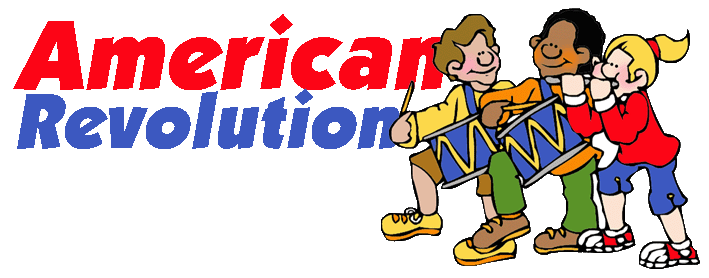For Teachers
Lesson 9: How did the colonists Win?
This is a very short lesson that can be fit in anywhere within the unit.
How was it that the poor weak 13 disorganized colonies managed to defeat the world's greatest power?
Well, the colonists had several large advantages that helped them offset the British military advantage. First and most important of these was: The colonists were fighting for their homes and families.
Class discussion What would you do if someone invaded the USA today and was burning down and destroying cities, towns and farms?
Get an opinion from each student.
This is what the colonists were facing. So you can see why the colonists were willing to keep fighting even when it appeared they were losing.
The second big advantage: Distance. Great Britain was 3,000 miles away. Across the Atlantic Ocean. The British had to bring their army with all its supplies across that ocean. This was a trip that took three weeks to a month in the sailing ships of the time. One month. Think about that. What would your life be like if you asked your parents a question and it took them a month to answer? Or when you asked for a meal and it took them a month to get it to you? This is what the British had to deal with.
The third big advantage: Foreign Soldiers. Great Britain did not have a large army. They had a very large Navy, but their army was quite small. So to help out the King hired German soldiers to go and fight in the colonies. These soldiers were called Hessian by the colonists since many of them were from the German province of Hesse-Kassel. These soldiers were paid to fight; this is called being a mercenary (another vocabulary word). The colonists, including those still loyal to England (loyalists or Tories), were angered that the King had hired soldiers who were not even British to fight them.
A fourth advantage (which was also a disadvantage) was the way of fighting. Colonists fought the way they had fought in the French and Indian wars. They hid behind trees and walls and shot at the British from ambush (a vocabulary word) and cover. The colonists couldn't beat the British in a European type battle (as we have seen - look at Washington's record of Battles Lost), but the colonists always seemed to recover and be back since they didn't lose many men. The British could and did win the battles and capture the cities, but the colonial army was always still there.
A final big advantage the colonists had was allies. The French, Dutch and Spanish all wanted the English to lose. So they gave the colonists all kinds of help. Finally the French actually declared war on Great Britain and formally joined with the colonies in their fight. This led to the great victory at Yorktown.
You can at this time compare the Revolutionary War with our war in Vietnam or even the current conflict in Afghanistan. Compare the similarities as well as the differences.

